Student Good Guide
The best UK online resource for students
- Journalism Personal Statement Examples
Your Journalism personal statement is a crucial element of your UCAS application . It is your opportunity to showcase your passion for journalism, your relevant experiences, and your potential to succeed as a journalism student. Check our journalism personal statement examples for UCAS , which can inspire and guide you in writing your successful personal statement .
Whether you are interested in broadcast journalism , print journalism , or digital and online journalism , these examples cover a range of topics and styles that can help you stand out to admissions tutors.

Journalism Personal Statement Example
As an A-level student in Business Studies, English Literature, and Religious Studies, I have always been passionate about education and learning. I have always been fascinated by the power of the written word and the impact that journalism can have on shaping public opinion and educating society. That is why I am so excited to pursue a career in journalism and continue to make a positive impact on society.
My interest in journalism was first sparked during work experience placements at my local newspaper, The South Wales Evening Post, and a local radio station. During my time at the newspaper, I was allowed to work with experienced journalists and editors, assisting them with research, conducting interviews, and writing articles for publication. This experience taught me the importance of accuracy, objectivity, and the need to present balanced viewpoints. Additionally, at the radio station, I learned about the power of broadcast media and how it can be used to reach a wider audience and engage with listeners on a more personal level.
As a great believer in education, I see the role of the journalist as an educating force, an incredibly important one. The media has a responsibility to inform the public about current affairs and provide accurate and unbiased reporting. Through my work experience, I have seen firsthand how the media can influence public opinion and shape perceptions of different issues. I believe that journalists have a responsibility to provide truthful and accurate reporting, whilst also highlighting important social issues and driving change.
Outside of my academic routine, I have several hobbies and interests that keep me grounded and motivated. One of my favourite pastimes is reading, particularly books that explore different cultures and perspectives. I also enjoy running, which I find helps me to clear my mind and think creatively. By engaging in these hobbies, I can maintain a balanced lifestyle and stay connected with the world around me.
Throughout my academic career, I have strived to excel in all of my studies. During my secondary school years, I was one of the best students in my class, achieving high grades in all subjects. This has given me a strong foundation and the skills necessary to succeed in a career in journalism. Additionally, I have travelled around the world and visited 56 countries so far. This has allowed me to gain a wider perspective on different cultures and societies, which I believe will be invaluable in my future career.
I am excited to continue my education and pursue a career in journalism. I believe that my passion for education, my experience in the media, and my diverse interests and hobbies make me an excellent candidate for this field. I am committed to using my skills and talents to make a positive impact on society, and I look forward to the challenges and opportunities that lie ahead.
Recommended for further reading:
- How to Write a Personal Statement for a Master’s
- How to Write a Personal Statement for a PhD
- UCAS Personal Statement: A Writing Guide And Tips For Success
- Tips for Writing a Personal Statement for the University
- How to Write a Personal Statement That Stands Out
- Personal Statement Examples UK
- Writing a Winning Medical Personal Statement
- How To Write A Personal Statement For Psychology
- How To Write A Dentistry Personal Statement
Personal Statement Example For Journalism
I am driven by my passion for the English language and the power it holds to inform, engage and inspire people. With a deep-rooted affection for the written word and its ability to capture the essence of life, I have always been fascinated by how language has evolved. As a student of English Literature, History and Media Studies, I have been able to explore this evolution in detail and develop my unique voice as a writer.
Studying English has allowed me to think critically, analyse the techniques used by both fiction and non-fiction writers and express my ideas and opinions through a portfolio of work. Through this, I have learnt how to craft compelling narratives, convey complex ideas with clarity and precision, and engage readers through powerful storytelling. My studies in History and Media Studies have complemented my understanding of English, allowing me to appreciate the importance of context, perspective, and the role of media in shaping our understanding of the world around us.
Outside of academics, I am involved in many creative pursuits that allow me to develop my skills as a communicator and storyteller. I participate in a drama group, where I am honing my skills in characterisation, improvisation and public speaking. I am also working towards my Bronze Arts Award, which involves creating and performing a piece of original drama. Additionally, I enjoy playing the piano, which requires a large amount of patience, creativity and dedication – skills that I believe are essential for a successful journalist.
I am proud to have received Young Writers Award from my Secondary School, recognising my talent and dedication as a writer. These accolades have encouraged me to pursue a career in journalism, where I can use my skills to inform, educate and entertain readers on a wide range of topics. I am excited about the prospect of being able to tell stories that matter, whether it is through investigative journalism, features or opinion pieces.
My passion for the English language, combined with my academic pursuits and creative pursuits, have prepared me well for a career in journalism. I am eager to continue my journey as a writer and storyteller, and I believe that a degree in journalism will provide me with the knowledge, skills and experience needed to make a meaningful contribution to the world of media.
Personal Statement Examples
- Animal Science Personal Statement Examples
- Anthropology personal statement examples
- Statistics Personal Statements
- PPE Oxford Personal Statement Example
- Classics Personal Statement Examples
- Theology Personal Statement Examples
- Physics Personal Statement Examples
- Chemical Engineering personal statement examples
- Oncology Personal Statement Examples
- Psychiatry Personal Statement Examples
- Earth Sciences Personal Statement Example
- History Personal Statement Examples
- Veterinary Personal Statement Examples For University
- Civil Engineering Personal Statement Examples
- User Experience Design Personal Statement Example
- Finance Personal Statement Examples
- Neuroscience Personal Statement Examples
- Graphic Design Personal Statement Examples
- Film Production Personal Statement Examples
- Events Management Personal Statement Examples
- Counselling Personal Statement Examples
- Forensic Science Personal Statement Examples
- Children’s Nursing Personal Statement Examples
- Chemistry Personal Statement Examples
- Sports Science Personal Statement Examples
- Mechanical Engineering Personal Statement Examples
- Electrical and Electronic Engineering Personal Statement Examples
- Quantity Surveying Personal Statement Examples
- Social Work Personal Statement Examples
- Physiotherapy Personal Statement Examples
- English Literature Personal Statement Examples
- Marketing Personal Statement Examples
- Computer Science Personal Statement Examples
- Fashion Marketing Personal Statement Examples
- Dietetic Personal Statement Examples
- Product Design Personal Statement Examples
- Aerospace Engineering Personal Statement Examples
- Geography Personal Statement Examples
- Business Management Personal Statement Examples
- Politics Personal Statement Examples
- Psychology Personal Statement Examples
- Oxbridge Personal Statement Examples
- Zoology Personal Statement Example
- Sociology Personal Statement Example
- Fashion Personal Statement Example
- Mathematics Personal Statement Examples
- Software Engineering Personal Statement Examples
- Philosophy Personal Statement
- International Relations Personal Statement Example
- Biochemistry Personal Statement Example
- Dentistry Personal Statement Examples
- Midwifery Personal Statement
- Law Personal Statement Example
- Medicine Personal Statement for Cambridge
- ICT Personal Statement
- Primary Teacher PGCE Personal Statement
- PGCE Personal Statement Example
- Games Design Personal Statement
- Paramedic Science Personal Statement Examples
Advice for Students , Application Process , Application Process , Applying to University , Top Tips , UCAS Application
Personal Statement: Applying for a Journalism/Media Degree

- application
- personal statement

A question I am frequently asked is what exactly you should write on your personal statement when applying for a journalism/media course. Putting together a great statement can be a pretty stressful task as it is difficult to gage what exactly universities are looking for. However, all graduates have been through it and there is no reason why you cannot secure a place on the course of your choosing. Here are some of my top tips on what exactly you should be writing:

Enthusiasm and passion
For me, I think this is the most crucial element to any application. Demonstrate just how passionate and enthused you are about the course. Perhaps pinpoint an element or a module that you are most excited about and why. Showing that you genuinely want to be studying that course always looks great and will put you in good stead with the admissions officer. Cardiff in particular has a fantastic student media department with its own newspaper, magazine, radio, and TV station. Make reference to these and emphasise how eager you are to get involved, maybe even mentioning that you aspire to be the editor-in-chief of the magazine, or a presenter on the radio station. Universities are always looking for people that want to get stuck in so convey this well.

Relevant experience
If you have done any kind of writing, editing, blogging etc. outside of school then absolutely put this in. This will show that you are not only able to use your initiative, but that you have the ability to work independently and have great time-management – all essential skills when studying at higher education. If you don’t already have a blog GET ONE. This is possibly the most simple and easy way to get journalism experience where you can write whatever you like, whenever you like, and wherever you like.
Even if you don’t directly have experiences like this, any part time jobs or qualifications you have will also be great for your statement as each will bring with them a useful set of skills for university.

A recent news story that has caught your interest
If you want to study journalism, you of course have to be up-to-date with all the latest happenings of the world. Writing a small paragraph on something in the news that has captured your attention and why will make your statement stand-out and show that you engage with the news. Don’t be afraid to have an opinion and articulate your feelings about something you feel strongly about.

Future goals
Why is it you want to study journalism/media? What do you hope to do with the degree you are applying for? Express that studying the course is a stepping stone for you to get into your dream career and that you truly believe the university will be able to support and facilitate that goal.

Finally, no human being is defined purely by work. Tell the admissions officer exactly who you are and show some personality. What is it you enjoy doing at the weekend? Do you have a hobby? No matter how common or unusual it is, put it in! If you play a sport then there is bound to be a society for that at Cardiff so let them know that you are desperate to get involved. You want to make it clear to the university that there is so much more to you than just academia, and that you will be an all-round great student to have study with them.
Thank you, this helped so much
Comments are closed.
- After University Chevron right
- Exams Chevron right
- Halls of residence Chevron right
- Second year Chevron right
- Settling in Chevron right
- Studying Online Chevron right
- Application Process Chevron right
- Clearing Chevron right
- Medic Tips Chevron right
- Open Day Chevron right
- UCAS Application Chevron right
- Why University? Chevron right
- Global Opportunities Chevron right
- Only in Cardiff Chevron right
- Travelling Chevron right
- Christmas Chevron right
- Cymraeg Chevron right
- Guest posts Chevron right
- Postgraduate Study Chevron right
- Clubs and societies Chevron right
- Cooking Chevron right
- Going out Chevron right
- Housemates Chevron right
- Lectures Chevron right
- Living away from home Chevron right
- Opportunities Chevron right
- Sports Chevron right
- Staying in Chevron right
- Student Heroes Chevron right
- Things to do in Cardiff Chevron right
- Third year Chevron right
- Jobs and work experience Chevron right
- Money Chevron right
- Renting a house Chevron right
- Studying Chevron right
- Uncategorized Chevron right
- Vlogs Chevron right
Student bloggers
Blogs by students for students
On this blog
Cardiff university blogs.
- Start a blog
- Explore more blogs
- Report a post or blog
Unless otherwise stated, the views contained within this blog are those of the author and do not necessarily represent the views of Cardiff University.
- How to Apply
Your future could be now.
But first you have to apply.
We know the application process can be confusing, so we’re going to walk you through everything you need to know. If you have any questions, email our admin team at [email protected] . We’re happy to help.
To begin, you must apply through NYU’s Graduate School of Arts and Science admissions website . The user experience and the length of the application can be intimidating. Don’t worry, we’re here to help. Read through the checklist below to become familiar with what you’ll need to submit and how and when to do it. Then take a look at our step-by-step visual guide.
What’s the application fee: $110. Sorry, we can’t do anything about that. See below for details on how to pay the fee.
What do I need to apply?
- A bachelor’s degree in any field.
- An official transcript from every academic institution you’ve attended. See below for details on transcripts, and if you have even more questions on transcripts, click here .
- Three letters of recommendation from people who know your work. Learn how to request and submit your letters of recommendation .
- A personal statement about why you want to earn a master’s degree in journalism. Learn more about what’s required in yours .
- Three writing samples. They don’t have to be published. We want to see how you write–academic papers, articles, blog posts, write something new for us–whatever you think best reflects your writing ability. The writing sample requirement may also be met by including links to multimedia work posted on Vimeo or YouTube, etc.
- The GRE is NOT required. Even if you see during the application process that it is required, please disregard. Many of our programs have dropped this requirement, finding that it isn’t the best indicator of future success in journalism. Lucky you!
- The TOEFL or IELTS is required for non-Native English speakers, unless you have completed a degree at an institution where the language of instruction is English. See below for more details and learn more about how to send in your scores .
Note: All application materials (including test score reports) should be sent directly to New York University – Graduate School of Arts and Sciences (GSAS), not to the Carter Journalism Institute.
We are currently accepting applications for Fall 2024. The deadline is July 1st .
View GSAS REquirements
Note for International Applicants
You must receive your undergraduate degree (U.S. baccalaureate or equivalent) from an institution of recognized standing before enrollment in the Graduate School. Students from India, Pakistan, Sri Lanka, Myanmar and Bangladesh must show completion of both the baccalaureate and master’s examinations prior to registration in the Graduate School. The examinations for the Bachelor of Engineering and the Bachelor of Technology meet the application requirements for the Graduate School. GSAS does not accept three-year degrees from Australia. For students holding three-year degrees from Australia, an additional four-year degree is required to apply.
Details on transcripts
One (1) official academic transcript, mark sheet, or final grades sheet (and English translation, if required) from each institution you attended should be uploaded on one of the “Transcript Upload” pages as part of your online application.
If uploaded, do NOT send paper copies of your transcripts to Graduate Enrollment Services. If you are offered admission, then you will be requested to provide an official copy. The baccalaureate or equivalent transcript should clearly indicate conferral of your undergraduate degree. If you are currently completing your baccalaureate, you should upload a transcript showing your academic record through your most current year of study.
All application materials (including test score reports) should be sent directly to GSAS, NOT to the Carter Journalism Institute.
For more questions on transcripts, click here .
Details on the TOEFL and IELTS
GSAS recommends that applicants achieve a minimum TOEFL score of 100 on the internet-based test (equivalent to 250 on the computer-based test or 600 on the paper-based test). For the IELTS, a minimum overall band score of at least 7 is recommended. Learn more about how to send in your scores .
How to pay fees
You can pay with a credit card. Or:
U.S. applicants: Your check, money order, or monetary coupon should be made payable to “New York University–GSAS.” Do not send cash. Please put your full name, date of birth, student number or Social Security number, and department name on the check.
International applicants: NYU cannot accept checks drawn on foreign banks. The application fee must be paid in the form of an international money order or monetary coupon, made out to “New York University – GSAS.” Please put your full name, date of birth, student number or Social Security number, and department name on the check.
A Visual Guide To Applying
If you get stuck, email Bebe Nodjomi at [email protected] .
Click here to access the application.
Below is the first screen you’ll see. Click Create An Account.
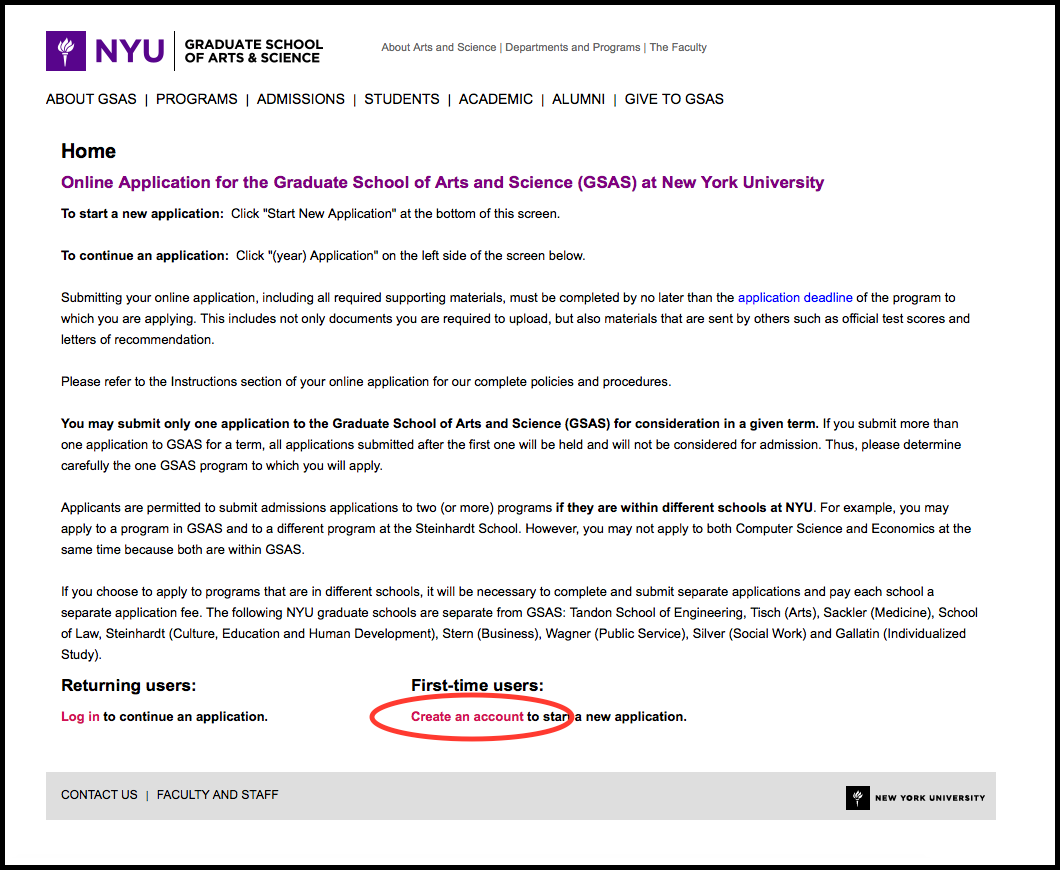
Click Start New Application
Navigate to Personal Part 1 , and fill in your information. Do the same for Personal Part 2 .
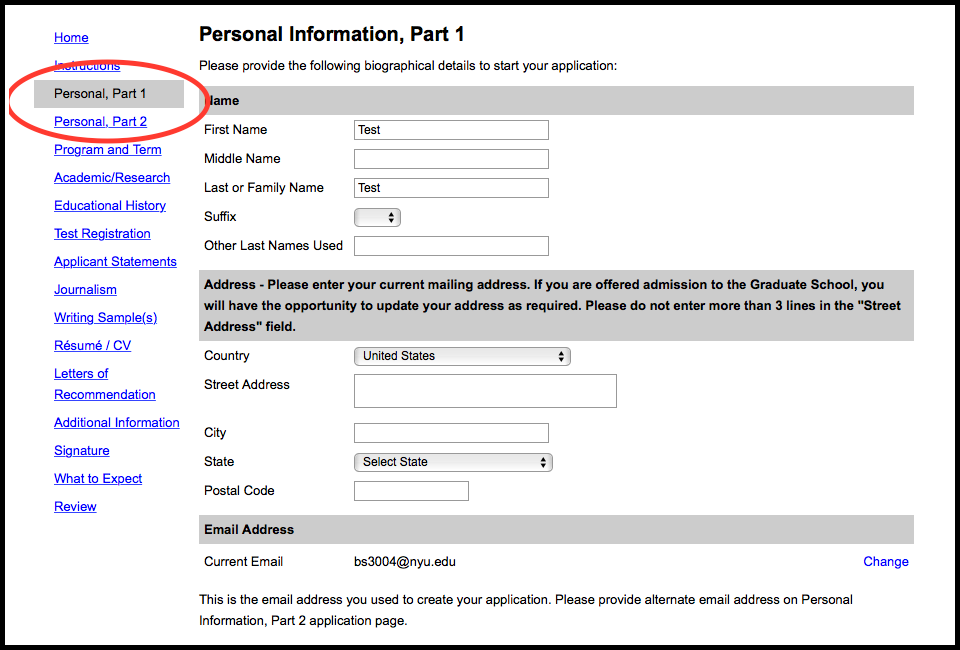
On the Program and Term page, choose Journalism–American Journalism (Online-Only) M.A. from the dropdown menu. It doesn’t matter whether you choose full-time or part-time at this point if you aren’t sure. Later, if you are accepted into the program, we can discuss which option will be best for you.

On the Academic/Research page, it’s fine to leave the first box blank, but feel free to fill it with journalists you’d like to meet, learn from, or learn more about–it could give us a better idea of your interests.

On the Education History page, click Add Institution at the very bottom.
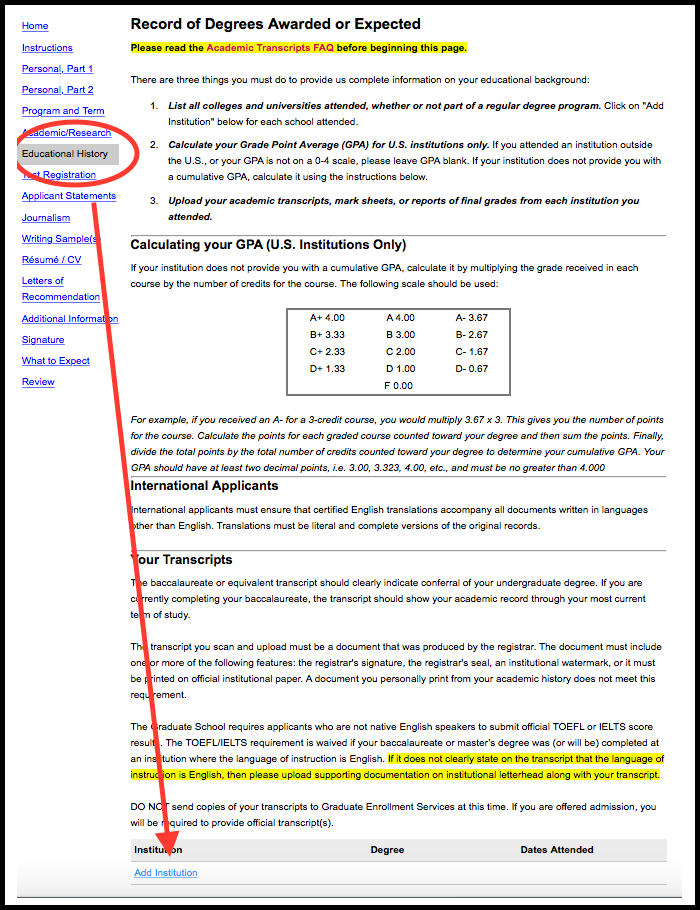
Then navigate through the drop down menus to fill out the location, institution, years attended, degree type, primary language of instruction etc. If you can’t find your institution, use this page to search for schools in the United States and this page to search for institutions outside the U.S.
Upload a PDF or scanned version of your transcript. After clicking Save, repeat the process for every academic institution you’ve attended.
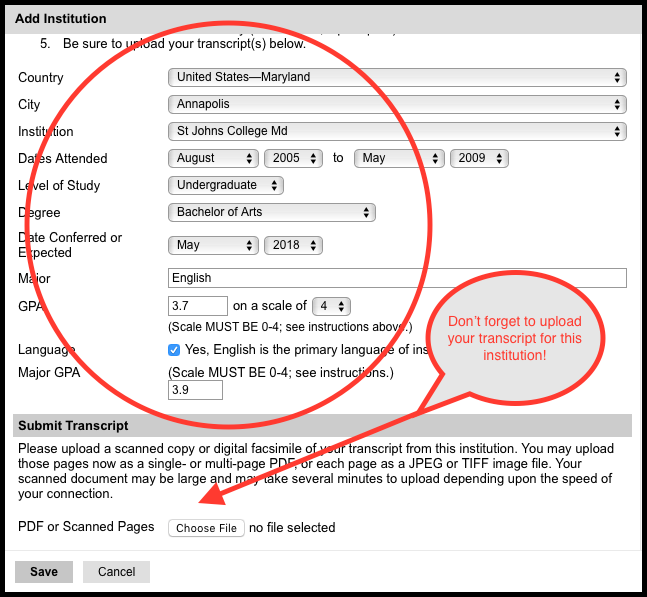
On the Test Registration page, please note that we do NOT require you to take the GRE. Only non-Native English speakers who have not completed a degree at an institution where the language of instruction is English must submit TOEFL or IELTS scores. You must arrange with the testing company to send your scores to New York University.
Submit your 1,000-1,500-word personal statement (called Academic Purpose ) on the Applicant Statements page. (Note that the Personal History section is optional.) Your essay gives us a sense of who you are, why you aspire to (or want to advance in) a career in journalism. It should address the following questions:
- What do you expect to get from the program?
- What aspects of your experience are most relevant to your interest in journalism?
- Tell us about your background–your academic degree, intellectual interests, work experience, life experience, and other sources of inspiration–and explain how this background informs what you want to do as a journalist.
- Experience is not required for admission into this program, but if you have published work, describe your existing “body of work” as a journalist, critic or just someone who writes.
- If you have yet to be published, tell us what kind of writing you want to do. What issues and ideas most engage you? What publications do you read regularly and why? Which journalists do you admire and who has influenced you?
The Journalism page asks you to acknowledge two things:
- You understand the course work in the program is conducted in English, and all written assignments must be in English. The online journalism program is unique in that it offers English-as-a-Second Language (ESL) support for students who may need help.
- You give us permission to recommend you to another journalism program at NYU if we think you would be a better fit for that area of study. We would only do this if we did not think you were the right fit for our program, but would be good for another. We just want to be sure that any incoming student is in the program that best fits their needs.
The video portion of this section is optional.
The Writing Samples page is required, but your samples don’t have to be published. We want to see how you write–academic papers, articles, blog posts, write something new for us–whatever you think is best. The writing sample requirement may also be met by including links to multimedia work posted on Vimeo or YouTube, etc.
Letters of Recommendation: We suggest reaching out to your recommenders ahead of time to be sure they are willing to write a letter on our behalf. Let them know about the program, why you are applying, and why they are positioned to speak to your qualifications. Then on this page, click Add Recommender, fill out their contact information, and click Send to Recommender. This will prompt an email to them telling them how they can submit their letter. Then click Add Recommender again–you must add contact information for three recommenders.
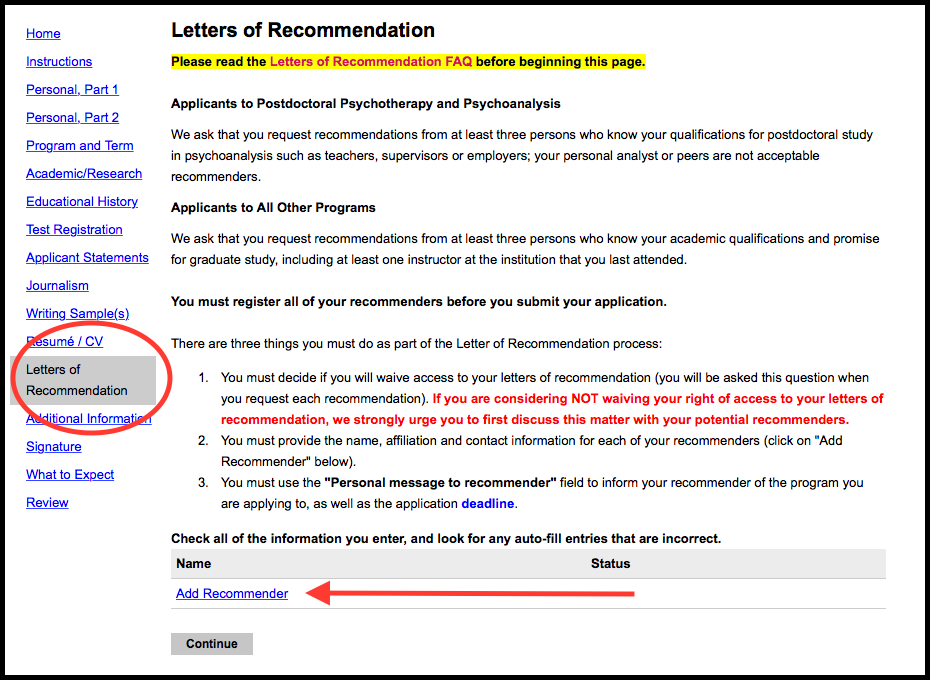
You’re almost there! The Additional Information page is optional. Type your full name on the Signature page. Read the What To Expect page carefully. It tells you what will happen after you submit your application. And finally, the Review page tells you about any errors with your application.
American Journalism Online Master’s Program
- Course Planning and Sequencing
- Faculty & Staff
- Career Services
- Student Work
- Minimum Technology Requirements
- Modern Journalism
- American Journalism Online Awards
- Alumni Profiles
- Mentoring Program
Widening Participation Outreach at City
Empowering underrepresented learners to access and succeed in higher education.
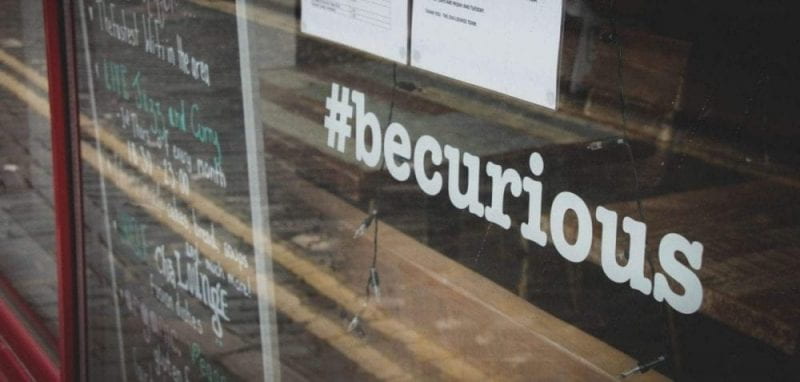
Journalism – Boost Your Personal Statement
Thinking about studying journalism at university but not sure what to include in your personal statement?
Journalism is a competitive industry, but if you’re considering studying a degree in this exciting discipline, it’s important that you convey your enthusiasm, capability and written communication well – your personal statement is therefore the best place to evidence these skills. Understandably, the current situation has made things very difficult for you to gain extra-curricular skills, but here are a few activities you may wish to do over the summer to research the profession more and to enhance your personal statement.

You may be undecided about the type of journalism you want to specialise in, be it newspaper, magazine, digital, TV or radio broadcast journalism, but that’s ok as a degree in journalism will give you the opportunity to explore different areas in more depth, so ensure that you check the content of your five university choices for variety. Also ensure that you research the profession – click here for further information.
After you’ve researched different careers, start researching influential journalists. You may aspire to be the next Faisal Islam or Vanessa Kingori, or it may be someone who writes or broadcasts about topics that you value such as the environment, music, fashion, travel, food, equality or human rights for example. Like artists, it’s always good to have a muse or a role model to admire from afar before you start developing your own style. So start watching TED talks, collate inspiring journalists’ work and dig a bit deeper into their backgrounds.
A sk yourself, what makes a successful journalist, influencer or campaigner?
Build upon the skills of a journalist
Check out the NCTJ Summer School , which boasts a series of video clips outlining the different attributes that make a great journalist. This has already started but you can check out the videos on YouTube and learn about a variety of journalistic skills such as news gathering, media ethics, law, sports reporting, fact checking and much more. Click here for access.
Another useful skill is touch-typing and improving the number of words-per-minute that you can type and you can take a free online course here. You may have also heard about news reporters taking notes using shorthand when interviewing people. This skill, used by many journalists is known as teeline and is great for when technology fails. Have a go at learning some of the basics here as well as brushing up on your grammar from the BBC news style archives.
For a variety of free online courses related to Journalism and Media, try Alison , Coursera, or Open Culture all delivered from universities from all over the world. This will give you a taste of learning beyond your current course and will equip you with research and independent study skills. Just ensure that you check the time commitment of the course so that it’s feasible for you to complete. It is also wise to keep up-to-date with what’s happening in the industry such as new technology, tools, apps and current affairs through the Journalism website – a go-to site for many journalists where you can read about current developments as well as listen to podcasts.

If you’ve not had any work experience yet, there are some virtual opportunities currently available. Although these are not journalistic roles, you will still acquire employability skills such as time-management, planning and working to a deadline – all skills transferable to journalism. View the following platforms on Chrome for opportunities: Inside Sherpa, Barclays Lifeskills and Speakers for Schools .
For writing experience, you’ll have to be persuasive and seek out opportunities yourself, so approach your local newspaper and ask if there are any virtual tasks you can help them with or see if you can interview a journalist about their job. The worst they can do is say no! Or try writing competitions such as the BBC Young Reporter, Young Muslim Writers Award , or the Walter Scott Prize to name a few.
You could also try blogging about issues that are important to you through sites such as WordPress or Blogger – don’t worry if nobody reads them, this is a way for you to collate your writing!
Volunteering in roles such as tutoring English or campaigning for social action is also great experience, so try Vinspired . You can always blog about your volunteering experiences too! Or why not approach other volunteering organisations and offer to write for them? You could even ask your school or college if you can start a newsletter, newspaper or social media communication – this will build your personal writing portfolio. Other ideas include volunteering for hospital radio when the situation becomes safer to do so. For information on this, click here.
These are just some cost-effective ideas for you to expand upon in your personal statement, but it’s not an exhaustive list so do keep your eyes open for other opportunities too.
Remember, like a journalist, be tenacious and create opportunities!
For further advice on your personal statement, email: [email protected]
* Always be cautious and check any online forum or employer with your teacher or people at home first, as your safety is paramount!

Leave a Reply Cancel reply
Your email address will not be published. Required fields are marked *
Save my name, email, and website in this browser for the next time I comment.
- Ask a question Ask
- go advanced Search
- Please enter a title
- Please enter a message
- Your discussion will live here... (Start typing, we will pick a forum for you) Please select a forum Change forum View more forums... View less forums... GCSEs A-levels Applications, Clearing and UCAS University Life Student Finance England Part-time and temporary employment Chat Everyday issues Friends, family and work Relationships Health News Student Surveys and Research
- post anonymously
- All study help
- Uni applications
- University and HE colleges
- University help and courses
- University student life
Postgraduate
- Careers and jobs
- Teacher training
- Finance and accountancy
- Relationships
- Sexual health
- Give feedback or report a problem
- University and university courses
- Universities and HE colleges
- Life and style
- Entertainment
- Debate and current affairs
- Careers and Jobs
- Scottish qualifications
- Foreign languages
- GCSE articles
- A-level articles
- Exam and revision articles
- What to do after GCSEs
- What to do after A-levels
- When is A-level results day 2024?
- When is GCSE results day 2024?
- Studying, revision and exam support
- Grow your Grades
Exam results articles and chat
- Exam results homepage
- A guide to GCSE and A-level grade boundaries
- Year 13 chat
- Year 12 chat
- Year 11 chat
A-level results
- Guide to A-level results day
- Get help preparing for results day
- A-level retakes and resits
- Exam reviews and remarks
- Here’s what to expect on A-level results day
- Six ways to help results day nerves
- Understanding your A-level results slip
GCSE results
- Guide to GCSE results day
- How GCSE combined science grades work
- Stressed about GCSE results day?
- Understanding your GCSE results slip
Finding a uni in Clearing
- Clearing articles and chat
- UK university contact details
- Guide to Clearing
- Seven things people get wrong about Clearing
- How to make a great Clearing call
- Finding accommodation after Clearing
- How Clearing can help you prepare for results day
- All universities
- Applying through Ucas
- Student finance
- Personal statement
- Postgraduate study
- Uni accommodation
- University life
- All uni courses
- Apprenticeships
- Arts and humanities courses
- Stem courses
- Social science courses
Universities by region
- North of England
- South of England
- Greater London
- Distance learning
- International study
University guides and articles
- All university articles
- Applying to uni articles
- Personal statements
Personal statement examples
- University open days
- Studying law at university
- Student life at university
- Careers and jobs discussion
- Apprenticeships discussion
- Part-time and temp jobs
- Career forums by sector
- Armed forces careers
- Consultancy careers
- Finance careers
- Legal careers
- Marketing careers
- Medicine and healthcare careers
- Public sector careers
- Stem careers
- Teaching careers
- General chat
- Relationships chat
- Friends, family and colleagues
- Advice on everyday issues
- General health
- Mental health
- UK and world politics
- Educational debate
Undergraduate
- Postgraduate Master’s Loan
- Postgraduate Doctoral Loan
- Disabled Students’ Allowances
- Taking a break or withdrawing from your course
Further information
- Parents and partners
- Advanced Learner Loan
Media and communication personal statements

On this page you'll find a collection of real personal statements written by students applying to study media, communication and related courses at university.
These personal statements are written by real students - don't expect them all to be perfect! But by reading through a few of these samples, you'll be able to get some ideas and inspiration for your own personal statement.
Media and communication personal statement examples
More help with your personal statement.
You can find personal statement examples for other courses by using this subject list, or by returning to our personal statements by subject page.
Other useful links
- Applying to university
The Student Room and The Uni Guide are both part of The Student Room Group.
- Main topics
- GCSE and A-level
- Exam results
- Life and relationships
Get Started
- Today's posts
- Unanswered posts
- Community guidelines
- TSR help centre
- Cookies & online safety
- Terms & conditions
- Privacy notice
Connect with TSR
© Copyright The Student Room 2023 all rights reserved
The Student Room and The Uni Guide are trading names of The Student Room Group Ltd.
Register Number: 04666380 (England and Wales), VAT No. 806 8067 22 Registered Office: Imperial House, 2nd Floor, 40-42 Queens Road, Brighton, East Sussex, BN1 3XB
- Personal Statements
- Journalism personal statement
Journalism Personal Statement Example
Sample statement.
If you want to apply to study Journalism at university then it’s almost a given that you’re good at writing but all good writers suffer from writer’s block occasionally, right?
For those of you that are struggling with a personal statement to study Journalism – here is our example to help you out:
Having developed a passion for writing at an early age my writing skills have evolved over the years and I now feel that a career in journalism is right for me. However, I am not prepared to rest on my laurels and I am always striving to further develop my writing skills.
I enjoy the challenge of conveying a story, event, or thought to a reader in an interesting, engaging, and easily understood way. I write my own blog and look forward to expanding my topic range when I reach university.
To expand my knowledge and skills in journalism I undertook a work experience placement at my local newspaper, The Waterside Herald, whilst I was at school. This gave me the chance to develop my writing skills to suit a journalistic style and to gain an in-depth insight into the daily life of a journalist.
Outside of school I enjoy travelling and hope that my love of travel will enable me to gain experience working for publications in other countries during summer breaks from university.
I am also a keen sports player and regular runner. As well as my academic goals I also hope to complete the London Marathon next year, something that I have been training towards for a number of months.
I look forward to the new challenges that life at university will bring and having the chance to learn new skills and build on my already high standards of writing and communication.
I hope that by studying journalism to degree level I will be able to gain an entry level position at a national newspaper such as The Guardian or The Times. I am also interested in pursuing television journalism as a possible career choice whilst at university.

University Guides
- Accommodation
- + much more!
Sign up for news & advice about applying to uni
- Universities
- Fees & Finance
- For Parents
- International Students
- Terms and Conditions


How To Write A Personal Statement For Masters (17 PDF Sample Examples)
Published: 14 Mar 2022 Study Abroad 108,054 views

A personal statement for masters program is one of the most important parts of your college application and writing a good one is what’s the exception between receiving an offer and being rejected.
If you’ve been tasked with presenting a personal statement, you should keep in mind that whatever you submit must put you forward as the right candidate for the course. Additionally, it should convince the admissions officers that you deserve a place on your program of study.
Achieving the above, is a skill most postgraduate students are yet to acquire but thankfully this article on How To Write A Personal Statement For Masters covers everything you need to know on doing this.
In this article you’ll learn:
- What is a personal statement?
- Tips for making your personal statement for masters stand out
- How to write a personal statement for masters
- Personal statement for masters sample
- Examples of personal statement for masters
- Conclusion – things to avoid when writing a personal statement for masters
Read: Admission Interview Tips .
What Is a Personal Statement?
A personal statement AKA admissions or application essay or statement of purpose is a type of essay or written statement a candidate presents to a college, university, or graduate school they are applying to, explaining why they want to attend that school, study a particular course, and why they would be a perfect fit for these things.
A personal statement for masters is an essay you submit specifically for your postgraduate application. Writing one presents the opportunity for you to promote yourself to a school and show the admissions teachers that you are the perfect candidate for a course.
Tips For Making Your Personal Statement For Masters Stand Out
Before we get into how you should write a statement of purpose for masters, we would first like to share with you certain tips to include in your essay to make it stand out from that of other applicants and be convincing enough to any admissions officer that reads it. The tips we have mentioned here, cover general things like starting and ending your personal statement, timing, length, and what to include and what not to include in the essay, etc.
1. Starting And Ending A Personal Statement
When starting a personal statement, you would want to right off the bat grab the reader’s attention. To do this, start the statement by writing about your degree of choice, next why you want to study it and then how you got interested in it.
The next 2 sentences after that should cover a summary of your background in the chosen field, and you conclude by saying what you plan to do once you acquire your graduate degree.
Also start with that the evaluators reading want to hear first, then every other information should come second. You will notice we’ve used in the sop examples for masters we will share with you later in this article.
2. Plan Ahead
A personal statement is not something you rush while writing, which means if you want to get something good before you application then you must start to decide things like the length and how long it should take to complete.
Let us throw more light on this…
For length, a personal statement should be brief ranging somewhere between 500 -700 words, although schools often detect how long it should be. So, this is dependent on the institution you are applying to.
In terms of what to say in a statement, you could include personal experiences like why you were driven to apply for the program, an experience you had with a scholar in your chosen discipline, a course you took that inspired you to pursue masters, or a key moment during your studies which further motivated you.
No matter what you decide to write, just keep in mind that you need to take your time to craft something good even if it means creating several drafts before the real thing and do not forget to proofread the statement for errors.
3. Research Your Program Of Study
Researching your program of study is one way to establish that you truly understand the discipline you’re getting into and prove to the admissions officer that you thoroughly thought about it before applying.
And because you want to put yourself forward as a serious candidate, one way to make you research easier is for you to visit the website of the department you are applying to. This page will contain information about faculty members, their specialisation, and publications.
From the intel, you gathered there you can now identify which professors match your interests and which ones you will benefit the most from learning under. After you’ve found this out, relate the same in a sentence or two in your statement of purpose for masters.
Example: “I would be honoured to study under the tutelage of Professor Nadia whose work I found resonated strongly with my beliefs and intended projects in this course”.
4. Avoid Clichés, Junks, And Many Details
When writing a statement of purpose for master degree try to avoid clichés, junks, and unnecessary details so that you don’t lose or bore your readers in between. Be as concise as possible, even if it’s your chance to express yourself.
A personal statement is an opportunity for the admissions committee to get information that tells the that you are suitable for the course. So, when you overpower your statement with too many words, stories, and useless details, you come off as someone who is just trying to meet the word count.
5. Include Your Personal History Only If It Adds To The Statement
Do not include your personal history in your statement of intent for masters if it is not relevant to your purpose of study. This means no need for you to tell that story about that time you helped someone treat a cut and immediately realised that you wanted to be a doctor or nurse or how you developed a taste for reading at a very young age.
We can guarantee you that the hundreds of other applications competing for the same spot you are felt the same way, so saying those things really doesn’t make you unique.
On the other hand, if you are going to add personal history to your statement, you can put in things like an internship you did and the experience you got from the job, a major research project you ran by yourself, publications you’ve read or published, conferences you’ve attended or presentations you’ve done. These experiences are more concrete and are directly related to your program of study. They also set you apart from other applicants.
6. Don't Use The Same Personal Statement For All Your Applications
One common mistake applicant make that you shouldn’t is using the same statement of purpose for master degree for all your applications. Using the same information repeatedly even if you are going to change the university names is risky and could land you in a big mistake on a day you forget to be thorough.
All programmes have their own unique set of questions they want to see answered and information they need in your personal statement.
And even if some of them like extracurricular activities, proposal for project, why you are applying to the school, your unique qualities, and research works you’re doing might appear the same, do not use one statement to respond to all of them.
Write a new unique personal statement every time you want to apply.
Check out: How to Write a Good CV for Students - Resume Examples for Students (PDF).
How To Write A Personal Statement for Masters
When writing a personal statement for masters there are several steps and ground rules you need to follow to ensure that it comes out good enough to impress the admissions team of a school, and ultimately convince them to give you a spot on your program of study.
If writing one is something you are currently struggling with and can’t seem to get down the process of it right no matter what, this section on how to write a personal statement for masters, discusses in detail everything you need to get help with yours.
There are 4 parts to consider when writing your personal statement and we have listed them below:
1. Planning A Personal Statement
A personal statement is a piece of writing showing your academic interests and is only for application purposes which means there is no room for any autobiographical information in it about your personal life. Be as to-the-point as possible when writing it and stick to telling the school why you are the right person for the course, plus any other extra information detailing your achievements.
Before You Start:
Allot plenty of time to write your msc personal statement so that you don’t rush it. Remember, this simple piece of writing is your one shot at convincing a school that you are the best applicant they’ve seen and as such can either make or break your application.
Read the information expected of you from the university, rules and guidelines given, selection criteria and understand what they mean. Also research the institution.
Do a thorough research on the course you are applying for; this will help you explain better why you want to study it. The tutors interviewing you can tell when you are lying and presenting yourself as uninformed can cost you the admission.
Ensure that you don’t use the same personal statement for all your applications.
When Writing:
When writing the statement there are some questions to ask yourself that can help you plan it better. Those questions are:
- Why you want to study a master’s and how does it benefit you in future?
- How does the course you have chosen fit into your pre-existing skill set?
- How do you stand out from the crowd as an applicant - e.g., work experiences you’ve had in the same field you are applying for?
- What do you aspire to do or be as a future career and how will the course help you achieve that?
- How can your work or skillsets contribute positively to the department/ university you are applying to, or society at large?
On the other hand, if you are applying for the masters to change from the field you studied in your undergraduate to another field, you should tell the school why you decided to take a different path in your studies.
Questions to ask yourself for this include:
- Your reason for deciding to change your discipline.
- How your undergraduate degree will be material for bringing fresh insights into your masters course.
- How changing your study path will help you attain your future career.
2. Structuring A Personal Statement
Having good structure for your personal statement for master degree is important because it ensures that everything from the beginning, middle, and ending of the statement is written and equally falls in place perfectly.
We’ve left some tips for you below to help you:
Start your personal statement with an attention-grabbing introduction that is not dramatic or cliché. That means you should not begin with any of these over-used phrases we’ve listed out below:
For as long as I remember…
Since my childhood…
I want to apply to this course because I’ve always felt a strong connection to it…
All my life, I have always loved…
My interest in (course) always ran deeper than…
I’ve always been zealous about…
Ever since I was a child, I’ve always wanted to pursue a career in…
My past educational experiences have always…
| 'My passion for Child Psychology is influenced by my curiosity in how autism affects the personality of children living with this condition. That's why I dedicated the 3rd year of my undergraduate study interning with the Child Rehabilitation Centre in my community, which caters to the patients and work closely with their families in developing care plans that work for their child. |
You would want to be as snappy as possible with your opening because the admission officer has over a hundred applications to read and can’t waste all their time on yours. This means you should avoid overpowering it with unnecessary facts, quotes, and stories from your life.
The middle part of your ma personal statement is where the main content of the write-up should be. This is where you show your dedication to the course you’ve chosen, what motivated you to choose it, and why you are the right candidate for it.
When writing the middle part of a graduate personal statement, you should:
- Give concrete reasons why you want to study a course at the University. The reason could be because of how the course is aligned to your future career or the University’s reputation in teaching that program.
- Mention relevant things like projects, dissertations, or essays you’ve done, and any work experience you have.
- Show proof of your core skills like and how they can contribute to the department.
- Prove what makes you a unique candidate.
- Discuss who your main influences for wanting to study the course are and why.
- Add experiences like memberships to clubs that are related to your field, papers you’ve written before, awards, scholarships, or prizes.
- Draw focus to how the course links to your past and future.
- Mention your academic and non-academic skills and how they fit the course.
For Formatting:
- Keep the statement length between 250 -500 words or as directed by the school.
- Sentences should be no more than 25-30 words.
- Use headings to break up the content – Why this university? Why this subject? Etc.
- Make claims and provide evidence to back each of them up. This can be done by discussing your work experience and academic interests.
Language and tone to use:
- The tone for your masters application personal statement should be positive and enthusiastic, to show you eagerness to learn and so that you convince the evaluators that you have what it takes to succeed.
- Use exciting and refreshing language, and an engaging opening line.
- Ensure you grammar, punctuations, and spellings are accurate.
- Avoid exaggerated claims you cannot backup.
- Don’t use cliché generic terms and keep your focus on the course.
Keep the ending of your essay for master degree application concise and memorable, leaving no doubt in the admission officers mind that you deserve a spot on the program.
To create the best ending summarise all your key points without dragging it our or repeating yourself. The ending should be simple, end on a positive note and make it clear that the school will be lucky to have you on their program.
Personal Statement for Masters Sample
In this section, we have left a masters personal statement example for you, which you can use as material to write yours for any course of study you are applying to a school for.
| My passion for Filmmaking, was influenced by my growing up reading novels and plays by my idols William Shakespeare, Tennessee Williams, and Maya Angelou, which graciously provided me with the opportunity to not just hear good stories, but also appreciate great storytellers whose plays still shake the foundations of the film industry. Growing up, I loved movies and found myself fascinated by the stories, the characters and most importantly the realization that the human mind could create something so beautiful and gripping. I studied each film like a guide and whenever they ended, I would act out the scenes on my own, putting on a one-woman show for myself whenever I was alone at home. These things would later form the basis of me writing my first published book which was a drama titled The Reward of Evil Deed. To me, loving literature and chasing it down all these years was something that made me different, but I also enjoyed it because films are more than something I just wanted to watch and forget, it is something that I wanted to be a part of. I didn’t just want to appreciate great films, I wanted to make them. During my bachelor’s degree in India, I had the privilege of taking Literature classes stemming from British, American, and Indian literature to broaden my mind. I was also opportune to read great authors like John Donne, John Milton, Emily Dickinson, Charles Dickens, Mark Twain, Anton Chekov, Virginia Woolf, and of course Margret Atwood who I follow closely on Instagram. Three years later not only did I graduate as one of the best students in the school, but I did so with a first-hand knowledge of what it means to be a passionate storyteller whose art transcends time, language barrier, and location. In addition to devouring Literature and watching satirical films like it’s the news, I am also an avid reader and prolific writer who throws herself into whatever she sets her heart on. I am the proud author of Forgetting Bangalore which is a personal memoir about my three years of studying in India, read amongst my closest friends who I shared those times with. In school, I also wrote the script for a short film for the class Psychology assignment titled The Ordeal which I uploaded to my YouTube page and uploaded to my application form. Apart from writing for myself, I also function as a content creator/marketer for companies I have worked for in the past and is still working for now. I play the Bass guitar well and occasionally dabble in Lead guitar. For far too long, I have aspired to be, but now I want to become a filmmaker and I strongly believe that through your institution that I would be able to learn and master all the aspects associated with filmmaking. I hope to attend Central Film School next year, enrolling in MA Practical Filmmaking under the tutelage of the amazing Faculty members. Although I don’t have the professional skills or much of a background in filmmaking, I am passionate and have a zeal burning strongly that it will set the film industry on fire. I am a good storyteller, I am brilliant, resilient, and determined to succeed, and when I want something, I push until I get it, I am also a fast learner. I strongly believe that these attributes are what will help me successfully complete this master’s program. |
Personal Statement PDF
You can also download this statement of purpose sample for masters degree pdf here and take your time to read it later – Personal Statement For Masters Sample .
See Also: Student CV Template .
Examples of Personal Statement for Masters
We have taken the time to source for some of the best postgraduate personal statement examples, which you can use in addition to the personal statement for masters program example as a template to write yours.
While you scroll through our list, you will find the perfect masters essay example for any field you wish to apply for, from business administration, to Psychology, to information technology, and lots more.
1. msw personal statement
We have found one of the best msw personal statement examples out there for you.
social work masters personal statement .
2. personal statement for masters in public health
mph personal statement examples
3. personal statement for masters in management
Personal statement for master degree sample for masters in management . , 4. personal statement for masters in education example.
personal statement for masters in education example
5. psychology masters personal statement
psychology masters personal statement example
6. sample personal statement for masters in data science data science masters personal statement
7. speech and language therapy personal statement statement of purpose for masters sample: speech and language therapy
8. business administration personal statement personal statement for masters in business administration
9. personal statement for masters in cyber security pdf masters degree personal statement examples for cyber security
10. personal statement for masters in finance msc finance personal statement examples
11. statement of purpose for masters in information technology pdf msc personal statement examples for information technology
12. international development personal statement statement of purpose for masters example
13. msc international business management personal statement international business management personal statement examples
14. computer science masters personal statement
statement of purpose for masters in computer science pdf
15. personal statement for masters in economics statement of purpose sample for masters degree in economics
16. mha personal statement statement of purpose format for masters in health administration
Conclusion – Things to Avoid When Writing A Personal Statement For Masters When writing a personal statement for university masters, there are some things you should avoid, so that you don’t ruin your essay. We have listed out those things below: • Avoid negativity. • Following an online template blindly. • Do not include unnecessary course modules, personal facts, or extra-curricular activities in your personal statement. • Do not lie or exaggerate an achievement or event. • Do not include inspirational quotes to your statement. • Avoid using clichés, gimmicks, humour, over-used word such as 'passion' or ‘driven’. • Do not make pleading statements. • Avoid mentioning key authors or professors in your field without any explanation. • Avoid using sentences that are too long. • Avoid flattering the organisation or using patronising terms. • Do not repeat information in your statement that you have already listed in your application. • Avoid waffling i.e., writing at length. • Don’t start writing your personal statement at the last minute.
Related Articles:
How to Write a Good Letter of Recommendation for Students (10 PDF Sample Examples).
How to Write a Good Financial Aid Appeal Letter (13 PDF Sample Examples).
How to Write a Good Personal Statement for a Scholarship ( 7 PDF Sample Examples).
How To Write A Good Motivation Letter For Scholarship (4 PDF Sample Examples).
How To Write A Letter Of Intent For Scholarship (4 PDF Sample LOI Example).
Latest Blog Posts
- US Visa Types Fees & Requirements
- 20 Free Social Media Marketing Course
- 30 Best Medical Universities In The US 2024
- Tips To Find And Apply For Scholarships Online
- 30 Best Study Techniques To Try This 2024
- 26 Best Country To Teach English 2024
- 26 Best Free AI Chatbot 2024
- 20 Best Countries To Relocate 2024
- Best Scholarships
- DAAD STEM Study Scholarships for Developing and Emerging Countries 2024
- UK Government Chevening Scholarship for Students Worldwide 2025
- Griffith University 2025 Australian Government Research Training Program Stipend Scholarship (Fully-funded)
- Acorn Foundation Kenneth Perszyk Snr. Adult Learner Scholarship for Undergraduate and Postgraduate Students 2025
- Old Mutual Imfundo Trust Scholarship Programme 2024
- Apply Now: ETH4D 2024 Doctoral Mentorship Grants for Developing Countries
- DAAD Research Grants in Germany Call for Application 2025 (Fully-funded)
- University of Waikato 2025 Research Masters Scholarship (Up to $15,000)
Scholarship Tips
Scholarships by country to study.
- United Kingdom
- United States
- South Africa
- New Zealand
- Netherlands
Scholarships by Category
- Postgraduate
- Undergraduate
- College School
- Entrepreneurs
- Bachelors Degree
- Women Scholarships
- Fully Funded
Scholarships by Country of Origin
- African Students
- Developing Countries
Scholarships by Institution / Company
- Flinders University
- German Academic Exchange Service (DAAD)
- University of Edinburgh
- The World Academy of Sciences (TWAS)
Scholarships by School
- University of Melbourne
- University of Kent
- University Of Queensland, Australia
- University of Oxford
- Privacy Policy
- Terms of Use
Scholarships
- Undergraduate Scholarships
- Masters Scholarships
- MBA Scholarships
- Ph.D Scholarships
- Fellowship Scholarships
- Fully Funded Scholarships
- F1 Visa Interview Questions And Answers
- Scholarship Application Letter
- Letter Of Intent For Scholarship
- Personal Statement For Masters
- Motivation Letter For Scholarship
- Scholarship Acceptance Letter
Other Locations
- Scholarships in UK
- Scholarships in Canada
- Scholarships for Nigerian Students
- Scholarships for African Students
- Study Abroad Community

7 ways to improve a journalism personal statement

As a journalism student, the question I hear the most from people wanting to study the subject at university is, “ how do I improve my personal statement?” and understandably so. Aside from your grades, your personal statement is your big chance to prove (or sell) yourself to that dream university.
It’s an arduous process with every word being sweated over and making the most of the strict word count. Deciding what to include is a nightmare in itself, so hopefully the following tips will help you improve your personal statement.
1. Researching and Deciding
Knowing what you want to do can be hard, but making a decision can make things a lot easier. Your personal statement will be much easier to write if you decide on one subject to apply for. Applying for multiple subjects (Journalism, History, English, etc.) can lead to an unfocused personal statement. Researching each subject and their related courses and then deciding what is best for you can make life easier.
Why is writing my personal statement so hard? I’m applying for journalism and creative writing courses I should be good at it — Chloe Becca (@ChloeBecca_) October 20, 2015

2. Get Blogging
The internet provides a great platform to get your writing out there. Blogging sites such as WordPress, Blogger and Google Blogs allow you to publish content for free and, if you’re lucky, build a readership. Even if nobody reads your blog, its a great place to archive your work.
3. Writing with Passion
Your personal statement should scream that you are passionate about writing and dream of becoming a journalist. After all, this is what your personal statement is about: proving how much you want to study the course. Don’t be too over-dramatic, but make the administrations person reading know how much you love to write.
4. Writing for an Online Publisher
What’s an online publisher? You’re on one. Sites such as Kettle Mag offer an excellent place to get articles published to a wider audience. They also introduce you to people just like you. Make sure to follow any style guide that the online publisher may have.
5. Work Experience
Nothing looks better on a personal statement than work experience. It provides you with experience as a journalist and also proves your interest in journalism. You can organise work experience by contacting where you want to work directly or you can get help through your school or college. Local newspapers are always a good option.
ok so i wanna go into sports journalism and ive got no experience and nothing to write about on my personal statement how stupid can i be?? — rachel (@hwatsonfan) July 21, 2015
6. School Newspapers
Busy days at school and college don’t allow for much time to be a journalist. That’s why becoming involved in a school newspaper is such a useful opportunity. It allows you to work on your writing skills, while having your work seen by other people. It’s also a handy place to start building up an archive of your work.
7. Show Your Ambition
So, you’ve said why you want to study the course and what you’ve done. But, it’s also important to say what you want to do after university. Do you want to become a columnist, a court reporter or a television reporter? There’s a long list of what a journalism course can lead to in the world of work and there is no pressure to make a firm decision at this point, but a quick mention of what you hope to achieve after university will show you have put some thought into your future and taking part in this course is something you really want to do to achieve that dream job.
For information on what journalism courses are out there check out our Journalism course search
You may also like

3 Ways to Enjoy a Thrilling Weekend on a Budget

Hobbies Well-Suited To Students

Unplug from Netflix and Find Fresh Activities to Enhance Your Leisure Time

Revise For The Prize – Tips For Exam Prepping

Tips On How To Prepare For Life After University

What to Know Before Getting a Guinea Pig

Fix It, Don’t Forget It: Why Repairing Items Beats Replacing In Your Home

How to choose the best pot for your plants?

How to Write a Stand-Out Personal Statement for Your Graduate School Application

While deciding to embark on the path to graduate school is an exciting first step toward advancing your career, the application process can sometimes feel daunting and confusing.
One major part of the application that most schools require is a personal statement. Writing a personal statement can be an arduous task: After all, most people don’t necessarily enjoy writing about themselves, let alone at length.
A compelling personal statement, however, can help bring your application to the top of the admissions pile. Below, we’ve outlined what you need to know about crafting a personal statement to make your application shine.
What Is a Personal Statement?
The point of a personal statement is for the admissions board to gain a deeper understanding of who you are apart from your education and work experience. It explains why you’re the right fit for the program and a worthwhile applicant. It’s also an opportunity to highlight important factors that may not be readily available in the rest of your application.
A personal statement is different from a statement of purpose (if you’re asked for that as well). A statement of purpose will touch on your academic and career goals, as well as your past credentials. While those should also be discussed in your personal statement, it’s more about your life experiences and how they’ve shaped you and your journey to graduate school.
Questions to Ask Yourself Before Writing a Personal Statement
Before you start crafting your essay, there are a few prompts you can ask yourself to help clarify what you want to accomplish.
- What are the key points you want to communicate about yourself?
- What personal characteristics or skills do you have that make you a strong candidate for this field?
- What exactly are your career goals, and how does graduate school play into them?
- What have you learned about this field already? When did you first choose to follow this path, and what do you enjoy about it?
- What do you think is important for the admissions board to know specifically about you?
- Are there any discrepancies or causes for concern in your application you need to address? For example, is there a career and schooling gap, or a low GPA at one point? This is the time to discuss whether a personal hardship may have affected your academics or career.
- Have you dealt with any unusual obstacles or difficulties in your life? How have they affected and shaped you?
- What sets you apart and makes you unique from other graduate school applicants?
- What factors in your life have brought you to where you are today?
Top Tips for Writing a Graduate School Personal Statement
Pick a few points to emphasize about yourself . Introduce yourself to the admissions board. Select key factors about your background that you want the university to know — elements that reveal what kind of person you are and demonstrate why you’re a strong candidate for the school and field of study.
Be very specific . Again, a personal statement is all about communicating what distinguishes you from other applicants. To accomplish that, you need to share specific anecdotes that underscore your statements. If you say you’re a strong leader, present an example of a time you’ve proven that skill through work, school or your personal life. These specific, personal stories provide a deeper understanding of who you are and prove your intentions.
Do your research . Demonstrate what attracted you to the program. If there is a specific faculty member or class that caught your attention, or another aspect of the program that greatly interests you, convey it. This shows you’ve truly researched the school and have a passion for the program.
“Whatever the topic may be, I would recommend writing in a manner that reflects or parallels the institution’s and/or department’s missions, goals and values,” said Moises Cortés, a graduate/international credentials analyst for the Office of Graduate Admission at USC .
Address any gaps or discrepancies . Explain any factors that may have impacted your academic career. If you had an illness or any other personal hardships that affected your grades or work, discuss them. If there is a discrepancy between your grades and your test scores, you can also take the time to go over any extenuating circumstances.
Strike the right tone . While it’s important to give readers a glimpse of your personality, avoid oversharing or revealing intimate details of your life experiences. You should also avoid making jokes or using humorous cliches. Maintain a professional tone throughout your writing.
Start strong and finish strong . As with any piece of writing, you want to draw in your readers immediately. Make sure to start off with an interesting and captivating introduction. Similarly, your conclusion should be a well-written, engaging finish to the essay that highlights any important points.
“ For a personal statement, I think the first and last paragraphs are most important and should always relate the program they are applying to their own experiences and ideas,” Hoon H. Kang, a graduate/international credential analyst with the Office of Graduate Admission, told USC Online.
Proofread, proofread and proofread again . We can’t emphasize enough the importance of rereading your work. Your personal statement is also an analysis of your writing skills, so ensure you have proper grammar and spelling throughout. In addition, we recommend having multiple people look over your statement before submission. They can help with the proofreading (a second person always catches a mistake the writer may miss), give advice about the statement’s structure and content, and confirm it’s the proper recommended length.
Once you’ve considered all of the above and reviewed and edited your personal statement to perfection, it’s time to submit and check off any remaining application requirements, including your resume and letters of recommendation .
Personal statements are arguably one of the most challenging aspects of applying to graduate school, so make sure to revel in this accomplishment and acknowledge your successes.
For more information, visit the Office of Graduate Admission at USC and explore USC Online ’s master’s degrees, doctoral programs and graduate certificates.
- How To Write Your Postgraduate Personal Statement
Postgraduate study
- Qualification types
- What are the differences between an undergraduate and postgraduate personal statement?
- Why study postgraduate?
What's on this page?
What is a personal statement, preparing to write your personal statement, opening your personal statement, work experience and future plans, ending your personal statement.
Your postgraduate personal statement is your chance to get noticed for your expertise and experience you’ve gathered. It’s an important part of the application process as it allows you to talk about yourself and your passions and prove the value you can bring to your chosen university.
In this article, we’re going to talk you through how to write a postgraduate personal statement that stands out and gives you the best chance of being offered a place on the master’s programme you’re applying for.
Shona Barrie – Director of Admissions, University of Stirling
You’ll have already written a personal statement for your undergraduate study, so you’ll know the importance of preparation. There are two things to think about when you’re planning:
- The practical and factual information you need to get across.
- Then, the more emotional, human parts of you that make you different to everyone else.
Before you start writing, take some time to think about the key things you’d want your chosen university to know about you, and get them down on paper.
Questions to focus your mind
- Why have you chosen this master’s programme?
- Why are you passionate about this subject matter?
- How has your undergraduate study influenced your decision to apply?
- Have you got any work experience that might help you?
- What life experiences have you had that you could talk about?
- What achievements can you talk about to support your application?
- Why do you want to study at this particular university?
- What plans and ambitions do you have for your future career?
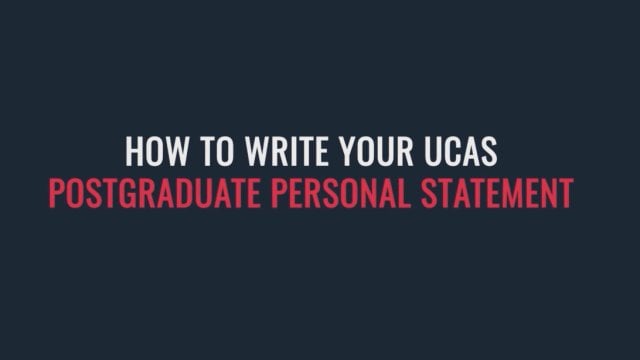
Three top tips
Be specific.
Remember that a postgraduate personal statement needs you to talk specifically about the university you’ve chosen.
Demonstrate experience
Universities will be looking for postgraduate students who are able to demonstrate expertise in a particular subject – so include that.
Show what you've learnt
Tell the university about your university life as an undergraduate and include any clubs or societies you were involved in.
Admissions tutors will be reading a lot of personal statements so it’s important to grab their attention right from the start.
You can find a full guide on How to start a personal statement: The attention grabber but here are the main things for you to think about.
- Don’t overthink the opening . Just start by showing your enthusiasm for the subject, showcasing your knowledge and understanding, and sharing your ambitions of what you want to achieve.
- Avoid cliches . Remember, this opening part is simply about introducing yourself, so let the admissions tutor reading your personal statement get to know you.
- Keep it relevant and simple . You’re limited on how much you can include so avoid long-winded explanations. Why use 50 words when ten can make your point?
Talking about the course
Now you’re ready to start talking about the course and subject you’re applying for.
There are four main areas you’ll need to cover in this section of your personal statement.
- Why are you applying for this master’s? Think about your undergraduate study and how this master’s will develop your expertise further. Do you have career aspirations this course will help you achieve?
- Why does the subject interest you? This is your chance to show your passion and really demonstrate who you are. If you have work or volunteering experiences related to the subject, include them here.
- Why do you think you’ll be an asset to the university? Your personal and practical skills combined together create a unique picture of who you are and why you’ll be a successful postgraduate student, so include both.
- How does your previous undergraduate study relate to the course? Showcase your enthusiasm for your current study and take the opportunity to demonstrate your skills and knowledge now, and how you want to build on that.
Next, you’ll need to write about your personal skills and achievements.
Universities like to know the abilities you have that’ll help you on the course, or generally with life at university. Don’t forget to include evidence to back up why you’re so passionate about the programme you’ve chosen.
Your personal skills and achievements
Be bold and talk about the achievements you’re proud of., include positions of responsibility you hold, or have held, both in and out of school., what are the things that make you interesting, special, or unique .
Your work experience and future plans are important to include in your personal statement. You should share details of jobs, placements, work experience, or voluntary work, particularly if it's relevant to your course.
- Try to link any experience to skills or qualities that’ll make you successful on your course.
- If you know what you’d like to do after as a career, explain how you plan to use the knowledge and experience you’ll gain.
It’s always good to connect the beginning of your statement to the end and a great way to reinforce what you said at the start. You want to see the ending as your chance to end in a way that’ll make the university remember you.
This final part of your personal statement should emphasise the great points you’ve already made and answer the question of why you should be offered a place on the course.
Read our full guide on How to finish your statement the right way .
Aakriti Labra – MSc Occupational and Organisational Psychology, University of Surrey
Now you’ve written your postgraduate personal statement, you’ll need to do a couple of final things before you submit it.
- Have you proofread your personal statement? Don’t just rely on spellcheckers. We’d recommend reading it out loud as that’s a great way to spot any errors as well as checking it sounds like you.
- Have you asked for feedback? Ask friends, family or your undergraduate university tutors to have a read through your personal statement and take their feedback on board.
- Check out our personal statement dos and don'ts Have a look at the common pitfalls against your final draft to make sure you haven't made any obvious errors!
Postgraduate
More advice.
Use the UCAS’ personal statement tool alongside this guide to help you structure your ideas.
Do you want to understand the differences between an undergraduate and postgraduate personal statement? Take a look at our guide here.
Why study a postgraduate course? Find out here.
What funding is there for postgraduate courses?
Sponsored articles UCAS Media Service
Student finance for postgraduate loans, how to find a job, five reasons to sign up to the ucas newsletter.

How To Apply Successfully For A Journalism Masters In The UK
December 16, 2022 (Updated December 21, 2023 )
For many of us, our last memory of applying to a university course probably involves UCAS — and you were probably pretty peeved when it destroyed all the formatting for your personal statement. You’ll be happy to know the process of applying for a journalism masters degree goes nowhere near that website.
However, if you are thinking about applying for a postgraduate course in journalism, you will need to put together an application that involves multiple parts. We spoke to the lecturers who sift through your applications and the students who’ve successfully applied to work out how to stand the best chance of snagging a place.
Is A Masters In Journalism Worth It?
Before you even think about putting in an application, it’s worth taking the time to work out if an MA in journalism is the right route for you and which one would suit you best. Research is key — City, University of London’s journalism department, for example, offers 10 different options , so it’s well worth taking the time to see which course fits you.
Don’t just assume you know what each individual course will entail. Instead, take the time to understand the knowledge and skills you will learn during each course, and think about whether those are suited to your interests and passions.
One example is how City’s International Journalism course isn’t a programme only for international students but is a course designed for students aiming to become foreign correspondents or hoping to work on a foreign news desk — a common misconception made by those who haven’t looked at the course information in detail.
Jason Bennetto, City’s senior lecturer in Magazine Journalism , recommends attending an open day if possible — you can see upcoming dates at City here , as well as what they involve. As well as being able to meet course tutors, students and alumni, and see the facilities, it’s an excellent place to ask a tonne of questions: Ask how much practical experience you’ll get, what kinds of guest lectures you can expect, and where alumni have ended up working. Some universities will also offer ‘virtual’ open evenings too — at City, there’s offer both a virtual open evening in April , as well as a session about journalism skills and jobs that’s open to all on January 31, 2024.
Many universities will also offer remote event options for those who can’t make it in person too — and we can’t stress enough how useful they are to understanding the resources open to you and the people you’ll be working with.
Asking where alumni work is one of the best questions to ask of potential courses. Rather than just telling you how many of their past students are in work, it gives an insight into the types of places you could end up working, where the course has industry links, and what kind of relationships they have with their alumni.
At City, University of London, more than 6,000 alumni are now working in respected positions within the industry, from newspapers and magazines, to broadcast and digital positions. Names you may have heard of include:
• Sunday Times columnist Dolly Alderton (Magazine Journalism, 2010)
• Author and broadcaster Gary Younge (Newspaper Journalism, 1993)
• BBC political editor Chris Mason (Broadcast Journalism, 2002)
• Former gal-dem editor and New York Times journalist Charlie Brinkhurst–Cuff (Newspaper Journalism, 2016)
• Fay Schlesinger, head of national news at The Guardian.
You can see even more alumni by looking through their annual XCity magazine here and more about their courses here .
What Are Courses Looking For In Applicants?
According to City’s senior lecturer in Magazine Journalism, Jason Bennetto, anyone who has a genuine passion and commitment to becoming a journalist should consider applying for a MA in Journalism at the university.
“We want people who want to be journalists and like asking questions,” explains Bennetto, when asked the kind of things they look for in applications. But he also urges people to be open about what they still need to learn.
“People with lots of ideas, who are curious about other people and world events, who are prepared to work hard and learn. But we aren’t looking for the finished article — remember, you come on the course so we can help you become a fantastic journalist.”

Zahera Harb, the head of City University’s MA International Journalism course, agrees. “If you are thinking of applying for a MA course in International Journalism, ask yourself if you really are interested in the news. You need to be up to date with what’s happening in the world to be a journalist. If you are curious, you should apply. If you’re not someone who reads, watches the news, or surfs online for news — or if you feel disconnected with that word — then perhaps this profession is not for you.”
In short, you want your application to show curiosity about the world, how you consume the news yourself, and that you’re open and willing to learn more.
“We offer support services and allowances to applicants with mental and physical health conditions,” Bennetto adds. “For example, we can offer extra time and support for students with dyslexia or dyspraxia. The campus also has wheelchair access and has catered for students with visual impairments. As with all our students, we always strive to make sure everyone is comfortable and looked after.”
What Do I Need To Apply For A Postgraduate Journalism Degree?
Aside from your mindset and personal statement, courses will typically ask you to submit your academic record, proof of proficiency in English if it is your second language, as well as proof of any journalism work experience to date. The exact requirements will vary from university to university and even course to course, so do check what you need before you sit down to apply.
“The requirements [at City] are a good second-class undergraduate degree or above in any subject,” says Bennetto. “We also welcome applications if you have relevant experience but without this level. And we have had people who have studied everything from humanities to maths, and even law.”
In addition, applicants should have an IELTS academic test of 7 and above, or an equivalent certificate in English if they graduated from a country where English isn’t an official language. A personal statement, proof of an undergraduate degree, and a CV will also be needed for the application. Finally, applicants must demonstrate having an interest or practice in journalism, best shown by already having completed work experience or similar.
“The latter is because we want evidence that students have genuinely thought about journalism by gaining some experience,” Bennetto explains. “Typically, people have worked on a student magazine, website, or radio station.
“They may have even gained work experience on local websites or professional publications — but working for a professional outlet isn’t necessary. We simply want to see you are curious about the world and have already shown a commitment to journalism.”
“Applicants sometimes refrain from applying altogether because they feel they don’t have enough work experience,” explains Harb. If you feel this way, she advises spending a week or two experience building before you apply. It doesn’t have to be a huge amount and is another reason to start thinking about your application early.
“If you do want to become a journalist, then engage with journalism by writing a blog or pitching to local or student media before you start your application.”
As previously mentioned, every course will have slightly different requirements for applications. But, as a rule, most will include a short written exercise. Depending on what is required and the student, applications can take from one day to a few weeks to put together.
On City’s MA Magazine Journalism , for example, students are asked to interview someone of interest in their local area and write a 250-word article based on the interview. The idea is to see if the applicant can find someone to interview, talk to them, and put it all together in a cohesive article, like they would have to in a newsroom.
Applications for City’s journalism courses are now open and run until the start of the next academic year — but early applications are encouraged.
They offer 10 courses tailored courses, all giving up-to-the-minute industry insights and access to specialist journalism facilities developed in consultation with BBC and ITN experts.
• MA Broadcast Journalism • MA Digital and Social Journalism • MA Global Financial Journalism • MA International Journalism • MA Investigative Journalism • MA Journalism, Media, and Globalisation (Erasmus Mundus) • MA Magazine Journalism • MA Newspaper Journalism • MA Podcasting • MA Television Journalism
You can find details on their Postgraduate Open Evenings on their website , as well as a virtual event in April and a journalism skills session in January .
A regular mistake made when applying is students not following instructions, warns Bennetto. People leave out things like their personal statement or the short written piece that many courses require, or they provide far too much information. “Remember, accuracy is important in journalism, so I recommend sticking to the course application brief on our website and making sure someone else checks your application for grammatical errors,” he says.
What Is The Deadline For Postgraduate Applications?
While most masters courses do not carry a specific deadline for applications, the recommendation is to start your application as early as possible — this will give you time to ensure your application ticks off all the requirements for your particular course, and that you have work experience to demonstrate your commitment to journalism.
Archie Earle, 23, a student in MA Newspaper Journalism at City, began his application in May, giving him time to consider his application assignments. “I spent three weeks on the application which involved a brief personal statement of 200 words and an interview with someone in the local community.”
Though we don’t necessarily recommend it, there are also applicants for whom taking a risk with time has paid off. Hridika Nandra, 22, completed her Master’s application in one day.
“After submitting my application, I heard from them the next day to arrange an interview. From then, it only took 48 hours to receive my official unconditional offer for the course!”
What To Write In A Personal Statement For A Masters
Whatever course you’re applying for, the chances are they’ll want a personal statement. The purpose is to introduce yourself to the course leaders, helping them to learn more about you and to get a snapshot of your background, experience, and motivation. In addition, it should show why you want to be a journalist and why you have chosen the university to undertake your particular programme.
“Be honest and straightforward,” Bennetto advises. “Address your chosen MA and tell us why you want to come to City to study that specific course. Demonstrate those things with examples of the work experience or other relevant work.”
Harb adds, “A common mistake is when students write one personal statement for a string of applications. Make sure you show us why you are interested in this specific course — and in us as a university.”
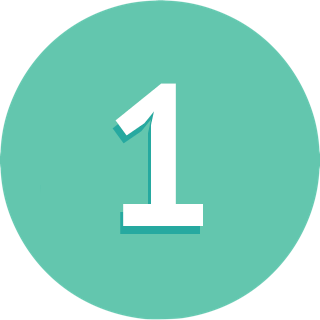
Almost all courses ask for a statement that gives a snapshot of why you want to apply for that specific course.
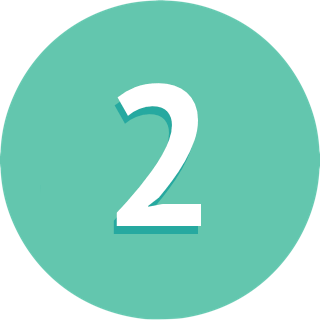
You’ll also be asked to provide proof of your academic records — such as a degree transcript from your previous institution.
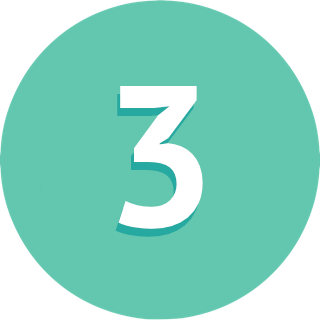
This could be writing your own blog or curating an Instagram page, student media, or something more formal.
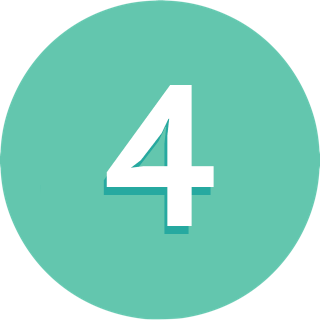
Some courses will ask you to complete an additional test to show your skills, like a short news piece.
Earle gave us a look into his personal statement: “I used my 200-word personal statement to talk about how I had wanted to be a journalist for a long time and how, since studying Politics and International Relations as my undergraduate degree, I had got experience at a student magazine and gone on to work on the data desk at the Times and Sunday Times.”
Nandra also demonstrated how a personal statement doesn’t have to be long-winded to be effective. “My personal statement was less than a page and included four paragraphs summarising my interest in journalism. The first outlined my work as an undergraduate student in Psychology and Consumer Marketing, and how the skills from the course could apply in a journalism setting.
“I then ran through my previous experience in a TV presenter role for britasiatv, such as covering the Commonwealth Games and going to red-carpet events. I didn’t just list what I had done, but also the skills I had learnt and show that applied to journalism. Finally, I explained why I looked forward to learning at City and why I had chosen the course I had.”
What Happens After The Application?
After you submit your application, it will then be sent for review by the team at your chosen university.
If your application ticks most of the boxes, you will typically take at least a month to receive an email offering you a one-on-one interview with your course leader , which will either be conducted in person or via Zoom.
Alternatively, some courses may offer you a place straight away. You can find out more about what to expect during an MA course interview here .
And as we promised, no UCAS was involved whatsoever.
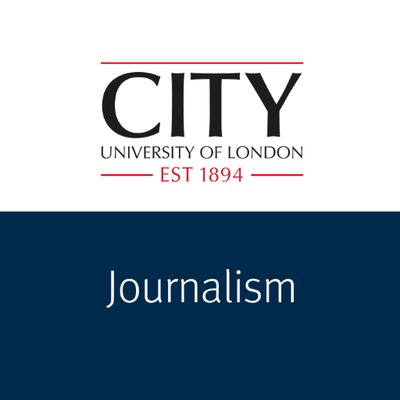
Wherever you are in the world, on any given day you are likely to see, hear or read journalism from graduates of City’s Department of Journalism .
Each year hundreds of people from diverse backgrounds apply to us who want the best education to enable them to get a great job in the media.
Here at City, we provide an intense and highly focused education to help you acquire the up-to-date journalism skills needed to enter your chosen area of the media.

- Applying to Uni
- Apprenticeships
- Health & Relationships
- Money & Finance
Personal Statements
- Postgraduate
- U.S Universities
University Interviews
- Vocational Qualifications
- Accommodation
- Budgeting, Money & Finance
- Health & Relationships
- Jobs & Careers
- Socialising
Studying Abroad
- Studying & Revision
- Technology
- University & College Admissions
Guide to GCSE Results Day
Finding a job after school or college
Retaking GCSEs
In this section
Choosing GCSE Subjects
Post-GCSE Options
GCSE Work Experience
GCSE Revision Tips
Why take an Apprenticeship?
Applying for an Apprenticeship
Apprenticeships Interviews
Apprenticeship Wage
Engineering Apprenticeships
What is an Apprenticeship?
Choosing an Apprenticeship
Real Life Apprentices
Degree Apprenticeships
Higher Apprenticeships
A Level Results Day 2024
AS Levels 2024
Clearing Guide 2024
Applying to University
SQA Results Day Guide 2024
BTEC Results Day Guide
Vocational Qualifications Guide
Sixth Form or College
International Baccalaureate
Post 18 options
Finding a Job
Should I take a Gap Year?
Travel Planning
Volunteering
Gap Year Blogs
Applying to Oxbridge
Applying to US Universities
Choosing a Degree
Choosing a University or College
Personal Statement Editing and Review Service
Clearing Guide
Guide to Freshers' Week
Student Guides
Student Cooking
Student Blogs
Top Rated Personal Statements
Personal Statement Examples
Writing Your Personal Statement
Postgraduate Personal Statements
International Student Personal Statements
Gap Year Personal Statements
Personal Statement Length Checker
Personal Statement Examples By University
Personal Statement Changes 2025
Personal Statement Template
Job Interviews
Types of Postgraduate Course
Writing a Postgraduate Personal Statement
Postgraduate Funding
Postgraduate Study
Internships
Choosing A College
Ivy League Universities
Common App Essay Examples
Universal College Application Guide
How To Write A College Admissions Essay
College Rankings
Admissions Tests
Fees & Funding
Scholarships
Budgeting For College
Online Degree
Platinum Express Editing and Review Service
Gold Editing and Review Service
Silver Express Editing and Review Service
UCAS Personal Statement Editing and Review Service
Oxbridge Personal Statement Editing and Review Service
Postgraduate Personal Statement Editing and Review Service
You are here
Journalism personal statement example 3.
I have for as long as I can remember had a fascination with people and different cultures which has manifested itself in the areas of work I have chosen during my time in travel, a national advertising company and at a filming company. The aspects of these jobs I have enjoyed the most are the research and analysis element as there is always something new to learn and conveying that information to a varied audience both written and verbally, be it researching a holiday destination for a client with special needs in travel, designing a business's advertising campaign or researching and developing a holiday destination film. The tsunami and September 11th broadcast, press coverage and the issues raised highlight just some of the reasons why I am pursuing a career in journalism. The world through tragedy was united in a common goal from what we witnessed from broadcasts and press coverage and the issues raised Journalism links our worlds together from local to international. It is a platform from which we can share our experiences, views, news and culture. I aim to become a skilled journalist that can generate an interest within my readers in order that they can make informed choices and build their own views in the world in which they live. I believe the freedom of the press is fundamental we as a society enjoy. . Since leaving school I have undertaken a variety of jobs largely in travel. On a day to day basis as a travel agent my main role was researching holidays for individual clients. I particularly enjoyed booking families anniversary's and weddings as they usually wanted something a little bit special or different and it really gave me something to get my teeth into. My success in travel can largely be attributed to the excellent communication and analytical skills I have developed both written and verbally listening and detailed notes I took from clients. Researching areas, costs and cultures, tailoring a holiday to their needs and conveying my findings to them in a jargon-free way.
My role within filming furthered my interest in journalism. As a project manager my main duties were to research accommodation to appear in a tourist destination DVD of Norfolk and on our website. Working within a multi skilled team and using my knowledge and experience in travel we compiled a tourist information film of over 100 different business's . From initial contact with the client to filming schedule and content and I was responsible for who and what was included in the DVD and website.The job satisfaction I gained in this role was in knowing what we featured not only gave the viewer clear understanding of what they could expect and enjoy whilst visiting the area but also the positive affect it had on promoting smaller lesser know attractions.
I have chosen this university course in particular because firstly it is close to home and convenient and also the course is offered to people like myself who would like to pursue a career in journalism .As a mature student I have acquired and will utilise in my studies aspects of self motivation, excellent time management and conscientious approach to my work . Relevant work skills I will use include those already mentioned and also the ability to work under pressure and meet deadlines, analysis and collation of complex data and can manage a wide variety of software
Profile info
This personal statement was written by kathleenleach for application in 2007.
kathleenleach's Comments
this statement got me the degree i wanted ive also found it copied onto other sites without my permission , i dont mind ppl using it as long as im given credit for it
Related Personal Statements
Irevelent statement.
Tue, 25/09/2007 - 13:25
too simple but thnkxs any way it might have helped others who are interested in the media world NOT ME
re comments
Mon, 01/10/2007 - 16:01
thanks..... i think
Tue, 09/10/2007 - 10:38
aightisuppose seems safe gyaie
thanks for sharing but in my
Wed, 28/11/2007 - 14:50
thanks for sharing but in my point of view, it's a little bit disjointed to be a suasive one
Wed, 09/07/2008 - 04:34
This was a great personal statement. One of the best I have read for journalism. Good job, no wonder you got accepted. Congrats. It was really good!
quite alreyt
Mon, 15/12/2008 - 11:25
so are you already a journo
Tue, 16/12/2008 - 22:33
so are you already a journo then ?
I am so sick of the cliches.
Sat, 02/10/2010 - 15:35
I am so sick of the cliches. Everybody equates their "travel experiences" to their interest in other cultures. Just because you have the financial means/opportunity to travel does not mean you are a culturally sensitive and open person.
I must admit, it is a good step to become more acquainted with the world around us blah blah blah, but if it's a Contiki tour or going to another English-speaking place or going abroad but still eating at Macdonalds and drinking at Starbucks trip, then this does not mean one has stretched nor challenged themselves.
I'm sorry but I think you over used your "background" as a travel agent too much to justify your suitability as a journalist. But then heck, I don't know what else could be used really? It's a cliche, but congrats that you got into the course that you wanted.
Add new comment

The Bartlett School of Planning
Writing an urban planning personal statement

Are you applying to study an urban planning master’s degree but don’t know where to start with your personal statement? This guide gives tips on how to write an urban planning personal statement.

This guide shares some tips on what you should include in your statement. Whilst we’ve given generic examples, your statement is personal to you. Give specific examples relevant to your life experiences. The admissions tutors want to learn more about you as an individual, your motivations and ambitions.
A final tip – avoid using AI tools to write your statement. It’s more obvious to us than you might think.
What to include in your personal statement
1. introduce yourself.
Introduce yourself, briefly sharing why you want to study your chosen urban planning degree. What are your interests in the field, and what sparked them? Was it a particular event, experience, or realisation?
2. Give your academic background
You may have already studied urban planning in the past. You also might have studied another relevant degree or want to move into the urban planning field using transferrable skills from another academic background. Either way, you should demonstrate your interest in the master’s degree and how you past degree fits with your urban planning interests and ambitions.
3. Share your career goals and professional experience
Share with us what is it about this course at this time in your personal and professional development that interests you? If you have previous professional experience, tell us about it. You may have already worked for a few years or have undertaken internships in a relevant field. You can discuss specific relevant projects you worked on, focusing on what you contributed and the impact of your work.
4. Tell us about your skills and competencies
What existing skills and knowledge do you bring to the course? This could be technical skills, such as using software or design skills relevant to the urban planning degree you have chosen. It could also be transferable skills such as problem solving, teamwork or leadership. Demonstrate how your unique skill-set fits with your degree of choice.
5. Explain why you want to study this particular course
Let us know why you want to study this degree at UCL’s Bartlett School of Planning. You might mention specific faculty members, courses, or resources that align with your goals. Discuss your long-term career aspirations and how this master’s degree will help you achieve them. You can be specific about the types of roles or organisations you aspire to work in.
6. End with a concluding statement
Wrap it all up summarising your main points and reiterating your enthusiasm to study this degree. Leave a lasting impression about your passion for the field.
Final thoughts
Hopefully these tips have sparked some ideas for how you can write an impactful personal statement. If you have any questions, don’t hesitate to get in touch by emailing [email protected] .
Choose your urban planning degree
City Planning MPlan Housing and City Planning MSc Infrastructure Planning Appraisal and Development MSc International City Planning MSc
International Real Estate and Planning MSc/Dip Sustainable Urbanism MSc Spatial Planning MSc Spatial Planning Degree Apprenticeship
Transport and City Planning MSc Urban Regeneration MSc/Dip Urban Design and City Planning MSc/Dip
Stay in touch

Register your interest in postgraduate degrees ►
Sign up for open days

Register your interest to receive invitations along with updates from our faculty and UCL.

IMAGES
COMMENTS
Journalism Personal Statement Example 7. 'Perseverance is not a long race; it is many short races one after another.'. Walter Elliott This epitomises my outlook on life. As a person I'm competitive, even more so when there is an end goal, and career wise for me, that goal is to educate nations on the development of the world...
Check our journalism personal statement examples for UCAS, which can inspire and guide you in writing your successful personal statement . Whether you are interested in broadcast journalism, print journalism, or digital and online journalism, these examples cover a range of topics and styles that can help you stand out to admissions tutors.
Journalism Personal StatementMy interest in journalism stems not only from my interest in writing but also my inquisitive nature: I like knowing what is happening around me. This knowledge is particularly vital with our ever-changing political, social, economic, technological, environmental and cultural climates. From the first newspaper published in 1605 to the wealth of free and paid papers ...
State clearly why you want to study journalism, and explain that you know something about the work of the central figure in journalism - the reporter. Demonstrate creative writing ability, a good presentational style, accurate spelling, correct grammar, and a sound grasp of the English language. Read quality broadsheet newspapers and follow ...
This personal statement was written by Danithehack for application in 2000. Danithehack's university choices Bournemouth University The London Institute London South Bank University Southampton Institute. Green: offer made Red: no offer made. Degree Journalism at The London Institute. Ratings. Statement rating: Related Personal Statements
Here are some of my top tips on what exactly you should be writing: Enthusiasm and passion. For me, I think this is the most crucial element to any application. Demonstrate just how passionate and enthused you are about the course. Perhaps pinpoint an element or a module that you are most excited about and why.
A personal statement about why you want to earn a master's degree in journalism. Learn more about what's required in yours. Three writing samples. They don't have to be published. We want to see how you write-academic papers, articles, blog posts, write something new for us-whatever you think best reflects your writing ability.
After completing the required courses for admission, passing the Critical Reading and Writing Skills Test, and applying with the personal statement below, I was successfully admitted to Harvard's Journalism Master's Degree Program. Sharing my personal statement for inspiration to those navigating a similar opportunity, and to put out in the ...
Journalism is a competitive industry, but if you're considering studying a degree in this exciting discipline, it's important that you convey your enthusiasm, capability and written communication well - your personal statement is therefore the best place to evidence these skills. Understandably, the current situation has made things very ...
I believe that I am well suited to the demands of a Journalism degree because I have a genuine interest and the motivation to work hard and succeed. This personal statement was written by vonce for application in 2011. Statement rating: The media's writing style today is owed to the 'New Journalists' of the 1960's and 1970's who transformed the ...
Media and communication personal statements. On this page you'll find a collection of real personal statements written by students applying to study media, communication and related courses at university. These personal statements are written by real students - don't expect them all to be perfect! But by reading through a few of these samples ...
Sample Statement. If you want to apply to study Journalism at university then it's almost a given that you're good at writing but all good writers suffer from writer's block occasionally, right? For those of you that are struggling with a personal statement to study Journalism - here is our example to help you out: Having developed a ...
7. speech and language therapy personal statement. statement of purpose for masters sample: speech and language therapy. 8. business administration personal statement. personal statement for masters in business administration. 9. personal statement for masters in cyber security pdf.
Deciding what to include is a nightmare in itself, so hopefully the following tips will help you improve your personal statement. 1. Researching and Deciding. Knowing what you want to do can be hard, but making a decision can make things a lot easier. Your personal statement will be much easier to write if you decide on one subject to apply for.
Personal statements are arguably one of the most challenging aspects of applying to graduate school, so make sure to revel in this accomplishment and acknowledge your successes. For more information, visit the Office of Graduate Admission at USC and explore USC Online 's master's degrees, doctoral programs and graduate certificates.
Personal statements are one of the most important parts of the application and sometimes the deciding factor for admission. Personal statements give a better understanding of who you are, beyond the rigid constraints of the "fill-in-the-blank" application. Like many around this time of the year, I am finishing my graduate school applications.
Just start by showing your enthusiasm for the subject, showcasing your knowledge and understanding, and sharing your ambitions of what you want to achieve. Avoid cliches . Remember, this opening part is simply about introducing yourself, so let the admissions tutor reading your personal statement get to know you. Keep it relevant and simple.
Doing a degree in journalism would be a stepping stone to my future career and I am looking forward to doing a degree which will enable me to achieve this. This personal statement was written by jenni66 for application in 2008. jenni66's Comments. After many drafts of my persoanl statement this is the final product.
Earle gave us a look into his personal statement: "I used my 200-word personal statement to talk about how I had wanted to be a journalist for a long time and how, since studying Politics and International Relations as my undergraduate degree, I had got experience at a student magazine and gone on to work on the data desk at the Times and ...
Personal Statement. In your personal statement please describe your educational and musical background, goals and objectives, and future career plans. Please feel free to include any information that you feel would be helpful to the College of Music in making our admission decision. Limit your statement to 300-500 words. Letters of Recommendation
This personal statement was written by kathleenleach for application in 2007. kathleenleach's Comments. this statement got me the degree i wanted ive also found it copied onto other sites without my permission , i dont mind ppl using it as long as im given credit for it. Ratings. Statement rating: Related Personal Statements
You've found your perfect urban planning master's degree. You've checked you meet the entry requirements and want to start your application. One of the most important parts of your application is the personal statement. The personal statement demonstrates to your future tutors not only your ...